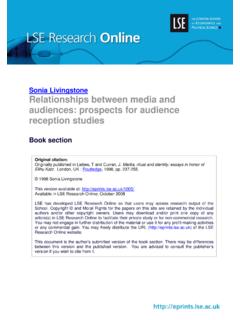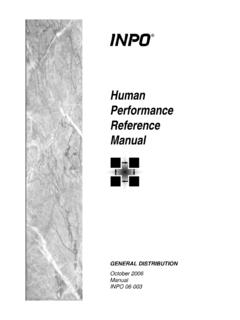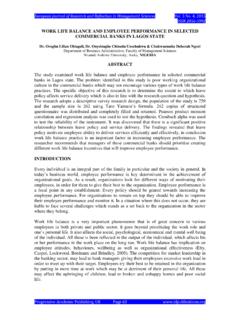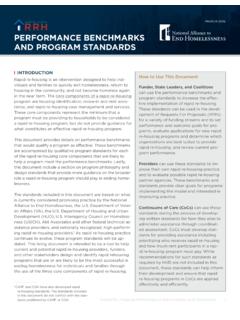Transcription of Making the link between work-life balance practices and ...
1 T. Alexandra Beauregard and Lesley C. Henry Making the link between work -life balance practices and organizational performance Article (Accepted version). (Refereed). Original citation: Beauregard, T. Alexandra and Henry, Lesley C. (2009) Making the link between work -life balance practices and organizational performance . Human resource management review, 19 . pp. 9-22. ISSN 1053-4822. DOI: 2009 Elsevier This version available at: Available in LSE Research Online: September 2009. LSE has developed LSE Research Online so that users may access research output of the School. Copyright and Moral Rights for the papers on this site are retained by the individual authors and/or other copyright owners. Users may download and/or print one copy of any article(s) in LSE Research Online to facilitate their private study or for non-commercial research.
2 You may not engage in further distribution of the material or use it for any profit- Making activities or any commercial gain. You may freely distribute the URL ( ) of the LSE. Research Online website. This document is the author's final manuscript accepted version of the journal article, work -Life practices and organizational performance 1. Running head: work -Life practices and organizational performance Making the Link between work -Life balance practices and organizational performance work -Life practices and organizational performance 2. Abstract The business case for work -life balance practices , as espoused by many organizations, rests on attracting better applicants and reducing work -life conflict among existing employees in order to enhance organizational performance .
3 This review of the literature provides some evidence for the claim regarding recruitment, but there is insufficient evidence to support the notion that work -life practices enhance performance by means of reduced work -life conflict. We suggest that the business case may therefore need to be modified to reflect the number of additional routes by which work -life balance practices can influence organizational performance , including enhanced social exchange processes, increased cost savings, improved productivity, and reduced turnover. The impact of these processes may, however, be moderated by a number of factors, including national context, job level, and managerial support. The importance of further research into the effects of these practices is discussed. work -Life practices and organizational performance 3.
4 Making the Link between work -Life balance practices and organizational performance Despite the popularity of work -life conflict as a topic of academic and practitioner debate, and the mounting prevalence of work -life balance practices ( family-supportive or family-friendly policies) in organizations around the world (Kersley et al., 2005; US Bureau of Labor, 2007), research on the organizational effects of such practices is not well integrated. Competing demands between work and home have assumed increased relevance for employees in recent years, due in large part to demographic and workplace changes such as rising numbers of women in the labour force, an ageing population, longer working hours, and more sophisticated communications technology enabling near constant contact with the workplace.
5 In response to these changes and the conflict they generate among the multiple roles that individuals occupy, organizations are increasingly pressured to implement work practices intended to facilitate employees' efforts to fulfil both their employment- related and their personal responsibilities (Rapoport, Bailyn, Fletcher, & Pruitt, 2002). While there is no one accepted definition of what constitutes a work -life balance practice, the term usually refers to one of the following: organizational support for dependent care, flexible work options, and family or personal leave (Estes & Michael, 2005). Hence these practices include flexible work hours ( , flextime, which permits workers to vary their start and finish times provided a certain number of hours is worked; compressed work week, in which employees work a full week's worth of hours in four days and take the fifth off), working from home (telework), sharing a full-time job between two employees (job sharing), family leave programs ( , parental leave, adoption leave, compassionate leave), on-site childcare, and financial and/or informational assistance with childcare and eldercare services.
6 work -Life practices and organizational performance 4. Over the past two decades, the outcomes of these work -life practices have been discussed in publications representing a number of different academic disciplines economics ( , Johnson & Provan, 1995; Whitehouse & Zetlin, 1999), family studies ( , Hill, Hawkins, Ferris, & Weitzman, 2001; Raabe, 1990), gender studies ( , Nelson, Quick, Hitt, & Moesel, 1990; Wayne & Cordeiro, 2003), industrial relations ( , Batt & Valcour, 2003; Eaton, 2003), information systems ( , Baines & Gelder, 2003; Frolick, Wilkes, & Urwiler, 1993), management ( , Konrad & Mangel, 2000; Perry-Smith & Blum, 2000), social psychology ( , Allen & Russell, 1999; Hegtvedt, Clay-Warner, & Ferrigno, 2002), and sociology ( , Blair-Loy & Wharton, 2002; Glass & Estes, 1997).
7 The most common approach is to view work -life balance practices through a business case lens: that is, by offering these practices , organizations attract new members and reduce levels of work -life conflict among existing ones, and this improved recruitment and reduced work -life conflict enhance organizational effectiveness. A review of the literature, however, questions this purported link between work -life balance practices and organizational effectiveness. The majority of studies investigating the outcomes of work -life practices do not measure work -life conflict, and thus cannot support this proposed mediated relationship (Eby, Casper, Lockwood, Bordeaux, & Brinley, 2005). The mechanisms by which the provision of work -life practices affects both employee behaviour and organizational performance remain unclear, and under-researched (Allen, 2001; Schutte & Eaton, 2004).
8 The results of a number of studies reviewed in this paper appear to suggest that work -life balance practices do not necessarily influence levels of employee work -life conflict, but instead improve organizational performance via other routes, such as reduced overheads in the case of employees working from home, improved productivity work -Life practices and organizational performance 5. among employees working at their peak hours, or social exchange processes arising from perceptions of organizational support ( , Allen, 2001; Apgar, 1998; Shepard, Clifton, & Kruse, 1996). This paper examines the literature to identify the various ways in which organizational work -life practices may influence organizational performance . Using a wide range of studies from a variety of disciplines, the empirical support available for the link between work -life practices and organizational performance at both the individual and organization level of analysis is reviewed.
9 Integrating the literature in this fashion provides us with important new insights regarding potential moderators and mediators of the link between work -life practices and organizational performance , and suggests new research questions that may further enhance our understanding of how (or if) this link operates. Figure 1 illustrates the relationships identified and suggested by this examination of the literature, and provides a structure for the framework of the paper. First, the paper will focus on individual-level explanations for the link between work -life practices and organizational performance , such as reduced work - life conflict, improved job-related attitudes and perceived organizational support, and use of practices . Organization-level explanations will then be explored, such as improved recruitment, retention, and productivity.
10 Within each section, the literature's major findings will be reviewed and the key implications drawn out. The paper concludes by discussing the future of work -life balance practices , analyzing inadequacies in current research, and identifying directions for future research. _____. INSERT FIGURE 1 ABOUT HERE. _____. work -Life practices and organizational performance 6. Rationale for methodology By conducting a comprehensive narrative review rather than a meta-analysis, we are able to examine the different ways in which work -life practices and outcomes are conceptualized and measured in the literature, and explore the theory underpinning the results. This is especially important when working in a field in which the literature is relatively young and not especially well developed, such as that concerning the impact of work -life balance practices .














